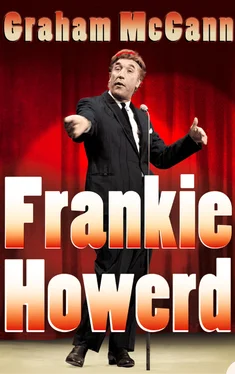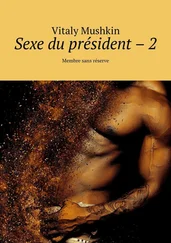Finding himself back in Eltham, âwith less than £100, a chalk-striped suit, pork-pie hatâ, 62 and that precious one-page reference from Richard Stone tucked safely away inside his jacket pocket, he felt some of the old nerves start to stir. Now aged twenty-nine, he stood for a moment alone, took in all of the familiar sights, and then thought to himself: âWhat now?â 63
Theyâre mocking Francis!
CHAPTER 4
Meet Scruffy Dale
My agent. Heâs a very peculiar man, my agent. Heâs got what they call a dual personality. People hate both of them.
It was an extraordinary coincidence. Shortly after Frankie Howard departed from the Army, he met not only the man who would soon prove to be one of the best things to have happened to his early career, but also the man who would end up seeming like one of the worst. These two men were one and the same: Stanley âScruffyâ Dale.
Of all the innumerable managers, promoters and sundry âten-percentersâ who struggled to make a living out of post-war British theatre, none was quite as mysterious, unorthodox and downright odd as Stanley Dale. Invalided out of the RAF after sitting on an incendiary shell that had penetrated his aeroplane (an act of valour for which he was awarded the Distinguished Flying Cross 1 ), he had since built a new career for himself in civilian life as a booker for the band leader-turned-impresario Jack Payne.
A whippet-thin man of average height with a sharp-featured face and short, curly hair that swept back over his head in shiny little ripples, Dale was notorious for his unpredictable office hours, his somewhat insalubrious personal habits and, most of all, for his chronically unkempt appearance. âScruffy was scruffy,â confirmed the scriptwriter Alan Simpson. âI mean, nearly every time I saw Scruffy [he] was in bed! He used to conduct all of his office meetings in bed, with a fag hanging out of his mouth â he never seemed to puff it, it always seemed just to burn away until there was nothing there but a sort of grey stick â and he had all of this ash dripping down on to his pyjama jacket.â 2
When, however, Dale managed to summon up the effort to rise from his bed and dress (which happened â if it happened at all â only very rarely earlier than noon), he was capable of giving off a certain âloveable roguishâ kind of charm, particularly when telling some of his extraordinary tales (many of them tall, a few of them positively colossal) about the remarkable things he had done, the astonishing sights he had seen and the impressive people he had known over the course of his improbably eventful life. Tony Hancock, for one, fell deeply under his spell for a while during the immediate post-war period, sitting around with him night after night, sharing cigarettes and drinks and listening wide-eyed and open-mouthed to his anecdotes about the countless narrow escapes he claimed to have experienced while serving in the RAF. 3
A budding young stand-up comic by the name of Jim Smith was another performer who would find himself drawn into Daleâs orbit. After seeing the teenaged Smith on stage at the start of the 1950s and quickly sensing his potential, Dale put him under contract, continued paying him a regular salary during his two years away on National Service, and, when he returned, gave Smith the âgiftâ of his own surname â so Jim Smith became Jim Dale, and the comedy performer was promptly re-packaged as a pop star.
One of the qualities that friends and clients alike admired in Stanley Dale (at the beginning at least) was the extent of his apparent devotion to their cause. Behind the risibly indolent image lurked a lively and surprisingly imaginative champion of whomever he found worthwhile. If a performer needed someone to transport a cumbersome trunk, set up a prop or simply flick a particular switch, Scruffy, invariably, would agree to do it. If a friend fell into financial trouble, Scruffy would often be the first to volunteer to fix it. If a client required a change of style, Scruffy would go straight ahead and dream another one up. Nothing, it seemed, was too much trouble for Scruffy Dale â just as long, of course, as it did not need doing before noon.
What tended to dazzle people most of all about Dale was his claim to possess a special range of entrepreneurial powers. At a time when many of Londonâs theatrical agents still seemed mired in the methods and manners of the pre-war Edwardian era, Stanley Dale appeared strikingly and excitingly progressive, buying and selling stocks and shares at both a speed and a level of complexity that rendered the average Variety artiste breathless and dizzy but also deeply impressed. He was regarded, recalled his former colleague Bill Lyon-Shaw, as âa whizz-kid of his timeâ. Any up-and-coming performer would obviously have craved such lucrative expertise, but with Stanley Dale, Lyon-Shaw noted, there was a catch to the whizz-kidâs promise of a boundless supply of cash: âHe whizzed quite a lot of it into his own pocket.â 4
The full extent of Daleâs many deceptions would only be discovered a decade or so later. Back in 1946, he struck most people as merely an eccentric but slyly effective wheeler-dealer, and there was one thing about this unconventional man of which no one was in any doubt: he had a genuinely sharp eye for new talent. It was this sharp eye that would soon spot Frankie Howard.
Howard first encountered Stanley Dale at the Stage Door Canteen in Piccadilly â a bustling little venue (based on the site occupied nowadays by Boots the Chemist) where Service men and women with a passion for performing could âmeet and seeâ. Howard, having recently been demobbed, should not, by rights, have been there, but he was already feeling desperate. During the brief time he had been out of uniform, Howard had failed yet another audition â this time at Butlinâs holiday camp at Filey in Yorkshire â and then tramped his lonely way around most of Sohoâs well-known (and quite a few of the more obscure) agentsâ offices without eliciting more than the faintest hint of sincere encouragement. The problem was always the same: âWhere can I see you perform?â each cigar-chomping agent would ask. âYou canât,â came Howardâs stock reply. âIâm not working.â 5 â
It was every young performerâs Catch-22: in order to work, one needed an agent, but in order to get an agent, one needed to work. There was no hope to be found in logic; the only hope to be had was in luck.
Just before Howard met Dale, he sat up in his old bedroom in Eltham and hatched an audacious plan to actively make his own luck instead of continuing to wait passively for its possible arrival. Remembering that one of the most sympathetic (or least unsympathetic) agents he had so far encountered â Harry Lowe â was known to be a regular in the audience at the Stage Door Canteen, he resolved to try to sneak his way in.
Late one morning in the middle of the week, he put his old Army uniform back on, retrieved Richard Stoneâs short letter of recommendation, passed politely on his motherâs kind offer of another brown paper bag full of cheese sandwiches, and set off âwith nervous impatienceâ to catch the bus bound for Piccadilly. 6 Marching into the secretaryâs office in what he hoped resembled a suitably soldier-like manner, he introduced himself as Sergeant Frank Howard and handed over the positive reference from Major Stone. The ruse worked: he was told that he would be on stage next Friday night at seven oâclock sharp. Racing off to the nearest public telephone, he notified Lowe of the news, and Lowe assured him that he would make every effort to attend.
Читать дальше












